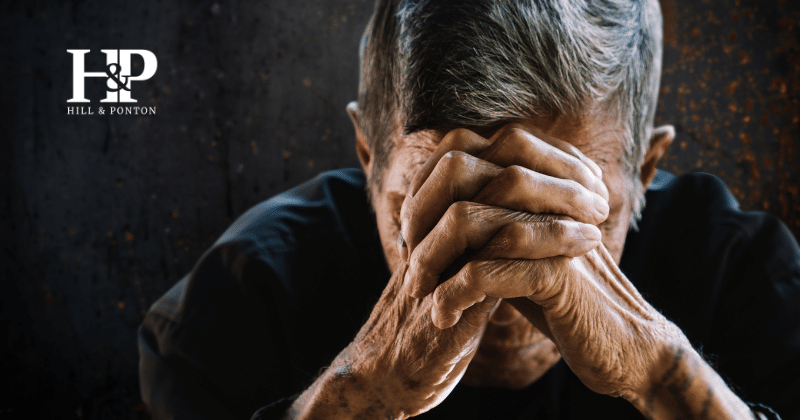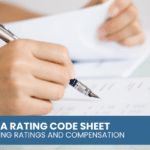According to the VA, it’s estimated about 1 in 3 (33.3%) of Veterans have some symptoms of depression; 1 in 5 (20%) have serious symptoms and 1 in 8 (12.5%) have major depression, requiring treatment with psychotherapy and antidepressants.
If you are a veteran who believes they may be struggling with depression or has been diagnosed with depression, we know that it can be a tough battle and one that is often hard to explain.
Understanding how the VA rates depression is often a necessity when obtaining disability benefits.
If you’re struggling to make sense of these ratings or feeling lost on what you should be rated based on your symptoms, we’re here to help.
In this guide, we’ll cover:
- How does the VA rate depression?
- How do I get service connected for depression?
- Do veterans get separate ratings for mental health conditions?
- What are the symptoms of depression in veterans?
- What is a C&P exam like for depression?
- FAQ about depression
What are the VA ratings for depression in veterans?
If you’d like to watch our video guide on ratings, you can see it below, otherwise continue down for an explanation of all the ratings!
0% VA Rating for Depression
This is typically a very mild presentation. If the VA awards a 0 percent rating, they have determined you have a diagnosis, but the symptoms do not result in a functional impairment or require medication. This rating is also non-compensable, meaning you will not receive monthly payments for this condition.
- Mild, transient periods of depression
- Minimal impact on work performance
- Symptoms largely controlled by medication
- No significant impairment on social relationships
10% VA Rating for Depression
This rating also represents a less severe form of depression. You may experience mild periods of depression resulting in social or occupational impairments, but no major functional impairments, and can be managed with medication.
- Mild sleep disturbances, such as difficulty falling asleep
- Occasional mild anxiety
- Slight impairment with social and occupational functioning
- Periods of depression that are infrequent and manageable
30% VA Rating for Depression
This rating is also meant to represent mild symptoms, but more pronounced than the 10 percent rating. “Occasional decrease in work efficiency and intermittent periods of inability to perform occupational tasks” may occur–meaning you might miss work on occasion, or be less involved in social activities.
- Frequent overeating or loss of appetite
- Disturbed motivation and mood affecting work
- Difficulty in establishing and maintaining effective work and social relationships
- Symptoms such as chronic sleep impairment, memory loss and fluctuating moods
50% VA Rating for Depression
This rating is a significant increase in the frequency, duration and severity of symptoms. Receiving this rating likely means you display more cognitive impairments. Some mood-associated symptoms may begin to manifest. Social and occupational impairments may also be significantly worse, and have a greater day-to-day impact.
- Reduced reliability and productivity due to depression
- Regular and more prolonged periods of depression
- Difficulty adapting to stressful situations, including the work environment
- Symptoms like panic attacks more than once a week, impaired judgement and mood disturbances
70% VA Rating for Depression
This rating represents a wide array of symptoms, including progression of previously noted symptoms. You may suffer from all the symptoms of previous ratings, but at higher frequency, duration and severity. The depression is likely constant, and causing regular issues with your day-to-day life.
- Suicidal ideation
- Obsessive behaviors with routine activities
- Impaired impulse control and neglect of appearance and hygiene
- Difficulty adapting to change, inability to establish and maintain relationships
100% VA Rating for Depression
This is difficult to obtain because the symptoms need to be so severe that they totally impair your life, to the point you are unable to function. There is a substantial decline in cognitive and emotional function. Self-injury and suicide attempts/ideology are consistent with a 100 percent rating. A 100 percent rating for depression can also include homicidal ideations.
- Inability to perform most kinds of work
- Persistent delusions or hallucinations
- Persistent danger of hurting oneself or others
- Grossly inappropriate behavior or total social isolation due to symptoms
You can still potentially work with a 100% VA disability rating for depression, but it is substantially more difficult to do so.
How do I get service connection for depression?
- A current diagnosis of the condition
- Evidence of an in-service event, injury or illness
- A medical nexus linking the current, diagnosed condition to the in-service occurrence
Were You Denied Benefits?
Your Time is as Important as Your Claim
Your moments are precious.
Don’t waste them on legal complexities trying to fight an appeal.
Get your free case evaluation with us today.
Can I get Separate Ratings for Mental Health Conditions like PTSD or Anxiety and Depression?
Can I get 100% Individual Unemployability (TDIU) Benefits for Depression?
Want to learn more about TDIU for depression? Check out our IU guide.
Read our IU Guide by clicking here!
What are symptoms of depression in Veterans?
- Feelings of sadness, tearfulness, emptiness or hopelessness
- Angry outbursts, irritability or frustration
- Loss of interest in activities
- Sleep disturbances, whether it is sleeping too much or too little
- Tiredness and lack of energy
- Reduced appetite or increased cravings for food
- Anxiety, agitation and restlessness
- Slowed thinking, speaking or body movements
- Trouble concentrating
- Suicidal thoughts, attempts or suicide
What are C&P Exams for depression like?
Ace your C&P exam the first time by clicking here!
Are You or Someone You Love in Crisis?
The VA has a Veterans Crisis Line equipped with responders who are trained to help 24 hours a day, 7 days a week, 365 days a year.
This Crisis Line connects service members, as well as their family and friends, with caring professionals through a confidential toll-free hotline, online chat, or text messaging service.
The Crisis Line can be accessed any of the following ways:
Dial 1-800-273-8255 and Press 1
Send a text message to 838255
Start a confidential online chat session at veteranscrisisline.net/chat
Find a VA facility near you
Frequently Asked Questions About VA Ratings for Depression
Why is it so hard to get a VA rating for depression?
What is the average VA rating for depression?
Can I receive Special Monthly Compensation (SMC) for depression?
- Permanently housebound because of service-connected conditions
- Another condition rated 60% or a group of conditions rated 60% that are unrelated to the 100% condition
Want to learn more about SMC benefits? Read our guide below.
Click here to read our SMC guide!









